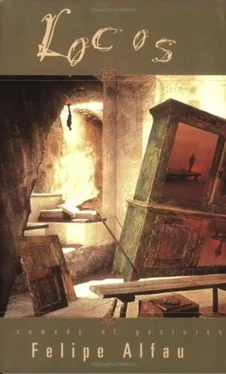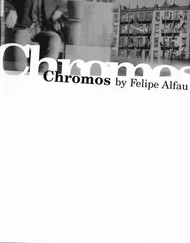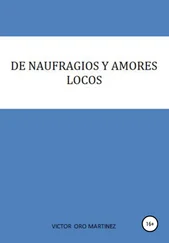He was a real artist and went through all the motions of a dance in perfect time with the waltz, turning, sliding over the stage, guiding his butterflies, his coat opening about him like another fan and disclosing a golden interior, his great figure and his impassive features illuminated by the footlights, as if the stage were an altar, as if it were a ritual dance petrified into eternity by the action of time.
At last the moment came when we were about to witness the almost miraculous performance of the butterflies spelling his name.
I sat all attention, but I was not destined to see that extraordinary part of the program. There was a silence in the music. The orchestra ceased playing and the pianist began the Rondeau Capriccioso of Mendelssohn.
At first I thought that this contrast was intended as a finale for the performance, but to my great astonishment, the butterfly charmer signaled the pianist abruptly to stop, then he closed his fan with visible disgust and as if by enchantment all the butterflies flopped down and disappeared inside the box.
Chinelato closed the box in a general silence, then he bowed to the audience and withdrew.
As I have said, Señor Chinelato or Señor Olózaga performed in his circus in several cities in Spain. However, gambling was a mania with him and he lost a great deal of money that way. Many of his artists and performers began to complain that he did not pay them and finally the circus dissolved.
After that Señor Olózaga went to Madrid and settled down. There he dedicated himself to promoting spectacles of all kinds. Being a showman was his long suit and he knew that this was the field in which he could make money. He also began to back bad toreros and in this he lost a great deal of money and likewise his wife, who ran away with the torero he was protecting at the time.
“But didn’t you know Tia Mariquita?”
“No, I never had that pleasure.”
“Well, you have missed a very curious person. Had it not been for certain discrepancies, she would have been quite a harmonious character belonging to a past age.”
I don’t remember the exact name of Tia Mariquita. Everybody called her that. She had a great number of nephews and relatives, close and distant.
Tia Mariquita had a wonderful imagination, she allowed herself to be carried away by it to such a degree that one could never tell truth from falsehood where she was concerned. It was due to that worthy lack of respect for exactness which characterized her that I was unable to find out about her origin or her life before the time I met her.
I remember her Sunday afternoon gatherings, a complex mixture of ordinary and extraordinary persons: South American poets, writers and actors whose works or performances no one had seen, and then an endless row of nephews and nieces. Pale shrunken-up boys prematurely old and also pale ultra-religious girls with mustaches. All of them the picture of tuberculosis bred from indoor life. I also remember the parents of these boys and girls listening to the conversation distractedly while watching their offspring intently, always on the lookout for misbehavior.
I particularly remember a lengthy stooping boy with short trousers exposing ugly hairy legs, which immediately called attention to his sullen, bearded face. This boy was on that occasion biting his nails voraciously.
His mother from the other end of the room signaled him to cease, with a gesture too vehement to pass unnoticed.
The boy shook his head doggedly and went on with more gusto than ever.
The mother, realizing that she was noticed, felt the necessity of explaining:
“He is very nervous. Lately he has taken to walking in his sleep. The other night we found him in the corridor walking toward the servants’ rooms.”
The boy turned as red as his deeply set anemia permitted and went on biting his nails, both hands in his mouth at a time.
“And has Dr. de los Rios recommended anything?”
“No.” This was the father speaking now. “He says that it is better not to send him to bed so early, but to let him take a walk at night, that the night air will do him good and he will sleep better after that.”
At these Sunday afternoon gatherings, Tia Mariquita recited poetry and accompanied herself at the piano. She was well in her sixties at that time, of a queenly carriage which she stressed zealously. Her hair was dyed in some carrot shade and her makeup cracked over her deep wrinkles. She dressed in fantastic gowns, pink or pale blue with much gold embroidery and lace and with marabou feathers all around and these gowns were long and trailed behind her.
The house was also furnished in harmony with her. It was over-draped, overcushioned, overcarpeted, overeverything. The walls were blended with the floors by overlapping rugs, bear and tiger skins and portieres. One had to negotiate seven layers of different materials before being able to open a window. There were palms in the corners and at the entrances of rooms and hanging from the ceiling. And there were chandeliers and fishbowls and two canary cages, a parrot and a lapdog. Oh, and several cases with knickknacks and a sea of exotic curiosities, painted shells and bric-a-brac hanging from walls and spread over the piano, little tables and mantels.
All this, however, as well as the mistress of the house, seemed a bit old, tarnished, dusty and patched together. Tia Mariquita and her house gave the impression that they had seen better times. Of course the whole ensemble was old-fashioned, but it was something more than that, it was that feeling of forgotten antiquity of a few years which is more intense than the antiquity of many centuries, and I don’t know why one felt that should one move a single piece of furniture there, the whole arrangement would collapse or disappear into thin air. Tia Mariquita often assumed a sad pose and spoke vaguely of her past:
“Those were the times! I remember those receptions, the time I entered and they took me for the Queen of. I don’t remember what country, but I know that they took me for a queen. Those were the times!”
She referred often to having lost a great deal of money and then I fancied that the row of relatives looked obviously alarmed.
Dr. José de los Rios, who took me there and who knew her rather well and had assisted her in one or two nervous attacks, made an attempt at a diagnosis.
“You know,” he said to me, “it is this atmosphere in which she lives. Everything here has remained stagnant, everything here belongs to the day before yesterday and she must refer to it. The windows are always shut and the outside air never comes in. Everything here would probably evaporate if it did. Even Tia Mariquita herself. She could not possibly stand the outside air. It would kill her. I have forbidden her to try it if she wants to keep alive. When she goes out she must do so in an old-fashioned carriage entirely closed and with as many curtains and cushions inside as possible.”
“Do you believe it is as bad as that?”
“Absolutely; certain atmospheres can prove deadly. Look at her secretary. The poor fellow suffers from a persistent cough, which has been treated time and again without results. That cough has become entangled in this house and it is impossible to eradicate it. It probably dwelled in this place for who knows how long and he has inherited it. He believes that he gets a different cough each time, but I have persuaded him that it is the same old cough with short intervals during which it takes a vacation and disappears among the draperies and then comes back to him. It is a persistent cough, an ineludible cough that has got hold of this house and of him and has taken root in both. A traditional cough entrapped inside these walls. Everything is so padded here that the cough does not even resound and therefore will never lose its energy. These traditional coughs are common in Spain.”
Читать дальше












